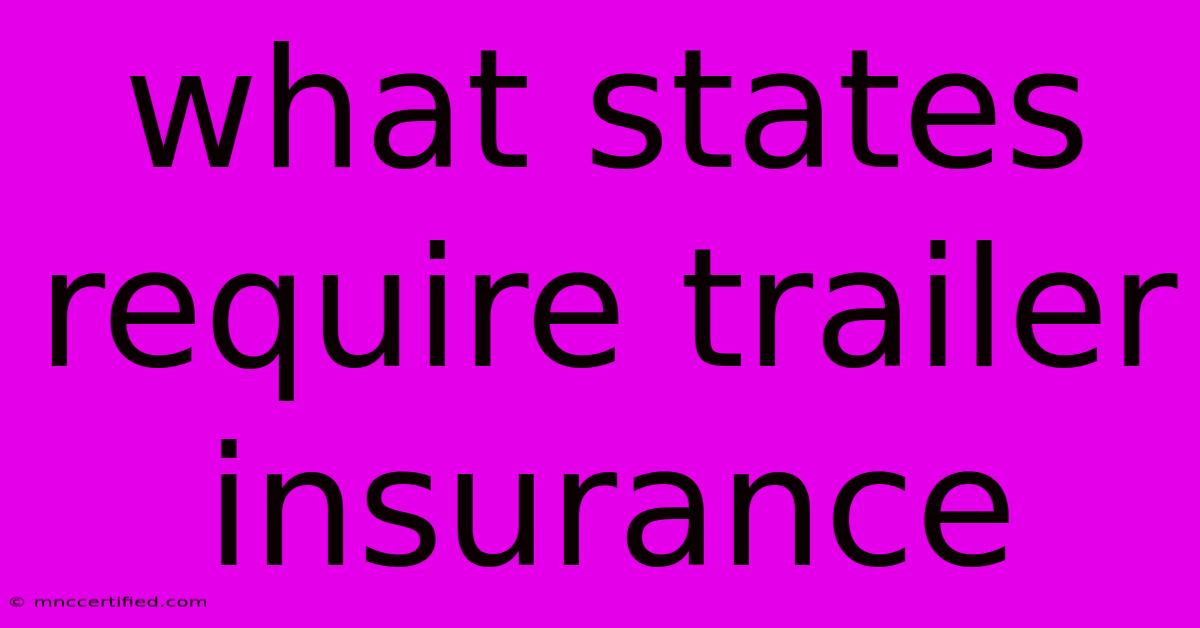What States Require Trailer Insurance

Table of Contents
What States Require Trailer Insurance?
Owning a trailer can be a great way to transport your belongings, equipment, or recreational vehicles. But before you hit the road, it's important to understand the legal requirements surrounding trailer insurance. While some states mandate trailer insurance, others don't. This guide will break down which states require trailer insurance and why it's crucial to consider coverage even if it isn't mandatory.
States Requiring Trailer Insurance
Unfortunately, there's no single nationwide standard for trailer insurance. Here's a breakdown of states that do require trailer insurance:
- Alabama: Alabama requires insurance for any trailer weighing over 1,000 lbs.
- Arkansas: Trailers over 1,500 lbs. require insurance.
- Connecticut: Insurance is needed for trailers over 10,000 lbs.
- Delaware: Insurance is required for trailers over 10,000 lbs.
- Florida: Trailers exceeding 1,000 lbs. require coverage.
- Georgia: Trailers over 3,000 lbs. need insurance.
- Hawaii: Trailers over 5,000 lbs. require insurance.
- Idaho: Insurance is required for trailers over 1,500 lbs.
- Illinois: Trailers over 3,000 lbs. need insurance.
- Indiana: Trailers exceeding 10,000 lbs. require coverage.
- Iowa: Trailers over 1,000 lbs. need insurance.
- Kansas: Trailers over 1,500 lbs. need insurance.
- Kentucky: Trailers over 1,500 lbs. require insurance.
- Louisiana: Trailers over 1,500 lbs. need insurance.
- Maine: Trailers over 1,000 lbs. need insurance.
- Maryland: Trailers exceeding 10,000 lbs. require coverage.
- Massachusetts: Trailers over 10,000 lbs. need insurance.
- Michigan: Trailers over 1,500 lbs. require insurance.
- Minnesota: Trailers over 1,000 lbs. need insurance.
- Mississippi: Trailers exceeding 1,000 lbs. require coverage.
- Missouri: Trailers over 1,000 lbs. need insurance.
- Montana: Trailers over 1,500 lbs. require insurance.
- Nebraska: Trailers over 1,000 lbs. need insurance.
- Nevada: Trailers over 1,000 lbs. need insurance.
- New Hampshire: Trailers over 10,000 lbs. need insurance.
- New Jersey: Trailers over 10,000 lbs. require insurance.
- New Mexico: Trailers over 1,500 lbs. need insurance.
- New York: Trailers over 10,000 lbs. need insurance.
- North Carolina: Trailers over 1,000 lbs. require insurance.
- North Dakota: Trailers over 1,000 lbs. need insurance.
- Ohio: Trailers exceeding 10,000 lbs. require coverage.
- Oklahoma: Trailers over 1,500 lbs. need insurance.
- Oregon: Trailers over 1,500 lbs. require insurance.
- Pennsylvania: Trailers over 10,000 lbs. need insurance.
- Rhode Island: Trailers over 10,000 lbs. require insurance.
- South Carolina: Trailers over 1,000 lbs. need insurance.
- South Dakota: Trailers over 1,000 lbs. need insurance.
- Tennessee: Trailers over 1,000 lbs. require insurance.
- Texas: Trailers over 1,500 lbs. need insurance.
- Utah: Trailers over 1,500 lbs. require insurance.
- Vermont: Trailers over 1,000 lbs. need insurance.
- Virginia: Trailers exceeding 10,000 lbs. require coverage.
- Washington: Trailers over 1,500 lbs. need insurance.
- West Virginia: Trailers over 1,000 lbs. require insurance.
- Wisconsin: Trailers over 1,000 lbs. need insurance.
- Wyoming: Trailers over 1,500 lbs. require insurance.
Why You Need Trailer Insurance
Even if your state doesn't require trailer insurance, it's highly recommended for several reasons:
- Liability Protection: Trailer insurance protects you financially in case you cause an accident while towing. It covers damage to other vehicles, injuries, and legal fees.
- Collision Coverage: This protects your trailer in case of a collision, offering financial support for repairs or replacement.
- Comprehensive Coverage: Covers damage to your trailer from events like theft, vandalism, fire, or natural disasters.
- Peace of Mind: Having trailer insurance provides a safety net, allowing you to drive with confidence knowing you're protected in the event of an unforeseen incident.
Types of Trailer Insurance
There are various types of trailer insurance to consider:
- Liability Only: This basic coverage fulfills the minimum requirements in many states, covering damages you cause to others.
- Comprehensive and Collision: Offers more extensive protection, covering damage to your own trailer.
- Specific Coverage: Insurance tailored to the type of trailer you own, like horse trailers or utility trailers.
Factors Affecting Trailer Insurance Costs
Several factors influence your trailer insurance costs, including:
- Trailer Value: Higher-value trailers generally require higher premiums.
- Type of Trailer: Certain trailer types, like commercial trailers, may have higher insurance costs.
- Your Driving Record: A clean driving record with no accidents or violations can lower your premiums.
- Location: Urban areas may have higher insurance costs due to increased traffic and accident risk.
Getting a Quote
To find the right trailer insurance policy, compare quotes from several insurers. Consider the coverage options, deductibles, and premium costs to make the best decision. Remember to be honest about your usage and driving history when providing information to insurers.
Conclusion
While some states require trailer insurance, it's a smart idea to have coverage regardless of your location. Trailer insurance protects you from significant financial burdens in case of accidents or damages. By understanding the various types of coverage available and obtaining quotes from different providers, you can ensure your trailer is adequately protected and you can enjoy your journeys with peace of mind.

Thank you for visiting our website wich cover about What States Require Trailer Insurance. We hope the information provided has been useful to you. Feel free to contact us if you have any questions or need further assistance. See you next time and dont miss to bookmark.
Featured Posts
-
Real Estate Agent Vs Insurance Broker
Nov 10, 2024
-
Association Of Life Insurance Counsel
Nov 10, 2024
-
Southland Life Insurance Phone Number
Nov 10, 2024
-
Watch Real Madrid Vs Osasuna La Liga Live Stream
Nov 10, 2024
-
Remembrance Sunday 2024 Royal Tribute To Fallen
Nov 10, 2024